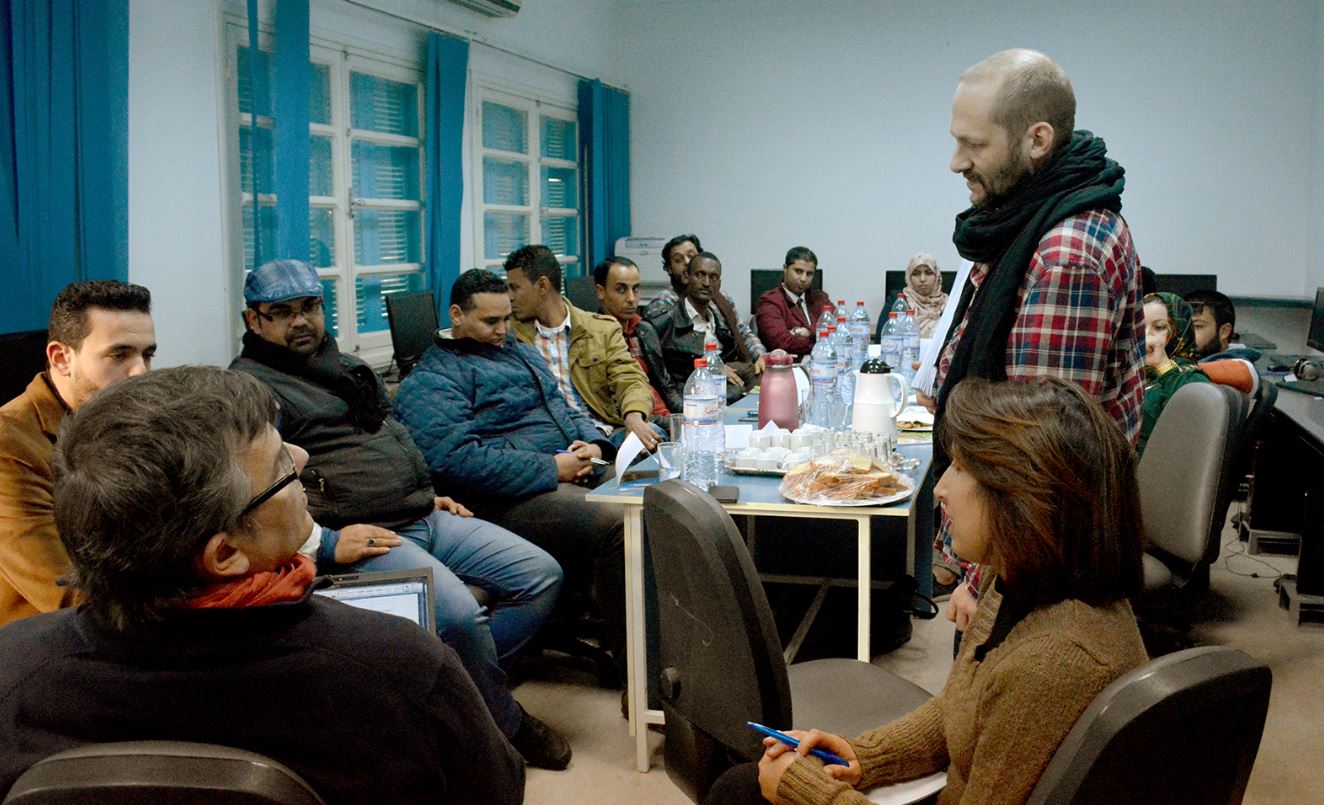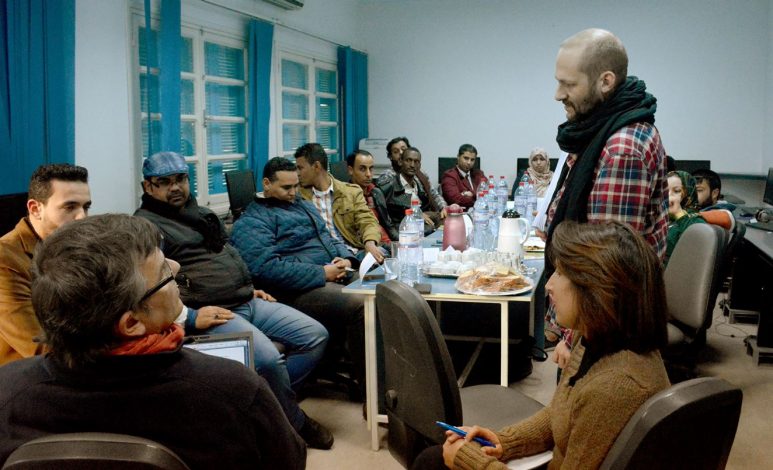Dates: 14 – 21 February 2015
Country: Libya, Tunis
 «They came for us, probably to kill us. My sister and I had to escape our home through the back door, and seek protection in exile », she said, breathing loudly. She has heart problems and often suffers from short breath. As many others in Libya, journalists are targeted in Libya on purely ethnic grounds. « At check points, if they find out you’re a journalist, they ask you from which part of which city you’re from”, says Youssef from Misrata. « And if you come from an area they don’t like, God help you”.
«They came for us, probably to kill us. My sister and I had to escape our home through the back door, and seek protection in exile », she said, breathing loudly. She has heart problems and often suffers from short breath. As many others in Libya, journalists are targeted in Libya on purely ethnic grounds. « At check points, if they find out you’re a journalist, they ask you from which part of which city you’re from”, says Youssef from Misrata. « And if you come from an area they don’t like, God help you”.

As Dune Voices platform extends to Libya, the safety of journalists there is even more crucial than ever. At a conference held in Tunis on 21 February 2015, the Media Diversity Institute proposed to 60 Libyan journalists, lawyers, civil activists, elected officials to discuss the issue of the protection of journalists in conflict zones such as Libya.
For his first public appearance, Tunisian Minister for Constitutional Institutions and Civil Society Kamel Jendoubi promised to do everything in his power to support the Libyan journalists who seek a shelter in Tunisia. “As an advocate of human rights, I am deeply convinced that media, like the judiciary, are the fundamental basis for any democracy“.
MDI Executive Director Milica Pesic and director of the African Centre for Training of Journalists and Communicators (CAPJC) Abdelkrim Hizaoui, both insisted on the importance of the conference and on engaging the stakeholders.
At the conference held in Tunis, MDI proposed to draft a Charter where journalists would commit to ethical and responsible reporting, while politicians, militians and citizens would respect the lives and work of journalists. As part of its Inclusive Voices project, a commission is now drafting the Charter which once approved by stakeholders, will be gathering signatures in the months to come committing stakeholders to protect journalists.
 A witness of the Algerian Black Decade with 200 000 deaths, including 70 journalists, Omar Belhouchet, the Editor of daily El Watan, urged his Libyan colleagues to resist to the silence terror seek to impose. “If today we still print in hundreds of thousands copies and are still widely read, this is truly because we kept witnessing and reporting at a time when only weapons wanted to be heard. This is because we resisted the law of silence”, he said.
A witness of the Algerian Black Decade with 200 000 deaths, including 70 journalists, Omar Belhouchet, the Editor of daily El Watan, urged his Libyan colleagues to resist to the silence terror seek to impose. “If today we still print in hundreds of thousands copies and are still widely read, this is truly because we kept witnessing and reporting at a time when only weapons wanted to be heard. This is because we resisted the law of silence”, he said.
The floor was then given to the testimonies of some of the 16 Libyan journalists who had just followed a Dune Voices week long production led training session. Jamal, from Kufra, described how he has been targeted on ethnic ground: he is a Tebu from South Libya. He was echoed by Mustafa a Tuareg from Gath. While Fadwa an Amazigh from Zuwara noted that journalists themselves become part of the conflict affecting her motherland.
Ahmed al Feituri, editor of Al Mayadine described how he had to hide over a year in his house – « how can you be a reporter then? » – His magazine had to shut down after its brand new printing plant was burned out. Jamel Bennour, magistrate and lawyer, former president of the Local revolutionary council in Benghazi described how the public radio created then was seized by militants with no possibility to appeal.
Constitution lawyer and Professor Abdelkader Kadura, a member of the Libyan Commission for the drafting of the Constitution thanked the conference to raise issues and propose solutions from the bottom up, and not imposed from the top: “Information, and the protection of media professionals, should obey civil criteria and not religious or tribal ones.”
Omar El Keddi, director of Bawabat Al Wassat, called for ad hoc training, as many in Libya became journalists at once after the revolution. “Partisanship is the greatest default” said Fatma Gandur, who despite her wide experience as university professor and editor, insisted to follow the Dune Voices training session: “These journalists who jumped on the train need to acquire an ethics of neutrality which would in turn only benefit the Libyan society through the promotion of tolerance and dialogue.”
Fatma was one of 16 journalists from all corners of Libya who followed the session held at the CAPJC in Tunis, from February 14 to 20. At first, tensions could be felt between journalists from warring cities. But prejudices were soon identified and brought down as debates launched during the session kept developing at lunches and dinners. Within a week, many became friends. All are now aware they have a colleague, and a source, to report on areas previously forbidden to them.
True to Dune Voices training creed, the session enabled the production of 16 multimedia reports: most dealt with Libyans in Tunisia: the war victims treated in Tunis hospitals, the traders and dealers active from Tunisia or the smuggling across the border. Stories are being finalised and soon to be published on www.dunevoices.info website.

